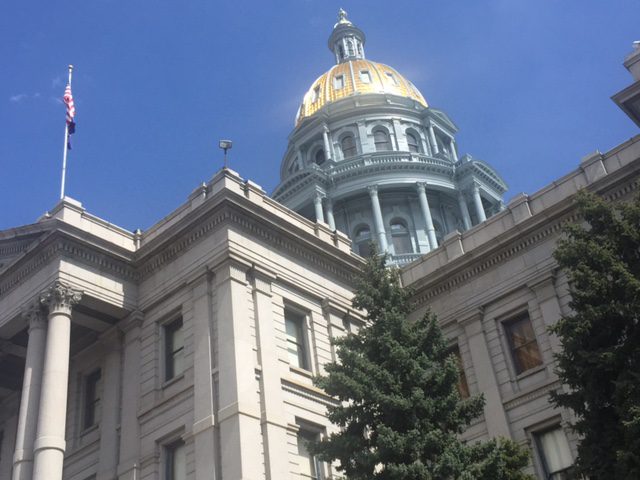A summary of the list of recommendations on the implementation of the OBBBA in Colorado regarding public benefits systems and work requirements.
Recent articles
CCLP testifies in support of Colorado’s AI Sunshine Act
Charles Brennan provided testimony in support of Senate Bill 25B-004, Increase Transparency for Algorithmic Systems, during the 2025 Special Session. CCLP is in support of SB25B-004.
Coloradans launch 2026 ballot push for graduated state income tax
New ballot measure proposals would cut taxes for 98 percent of Coloradans, raise revenue to address budget crisis.
CCLP statement on the executive order and Colorado’s endless budget catastrophe
Coloradans deserve better than the artificial budget crisis that led to today's crippling cuts by Governor Jared Polis.
Legislative Update: March 22, 2019

Bill to Watch: HB 1239
As mandated by the U.S. Constitution, the census process happens only once every 10 years, but the outcomes reverberate for the next decade. The census is the foundational underpinning of our democracy, in large part because congressional districts are re-apportioned on the basis of the census.
Unfortunately, people who are under-counted are generally under-represented in the political process. For example, low-income people are at greater risk of being under-counted because they often lack access to the internet (2020 is going to be the first primarily online census). Under-counted people may reside in hard-to-reach rural areas, or they may live in non-standard housing that U.S. Census workers may overlook during their canvassing phase. Also, people of color and people who have recently immigrated to the United States, along with those with English-language barriers tend to be disproportionately under-counted.
Political power isn’t the only thing at stake, however: Colorado receives billions of dollars every year in federal funding that is based on the number of people living within the state, and on the composition and demographic makeup of the people who live here. One recent study estimated that Colorado stands to lose over $2,000 per person, per year in federal funds for anyone who is missed by the census. Add that all up, and Colorado could stand to lose more than $63 billion in federal funding over the next decade if the census under-counts just 1 percent of the people living in our state.
Known as the “Everyone Counts in Colorado Act,” House Bill 1239 would create a $12 million grant program within the Colorado Department of Local Affairs, which would be awarded to local governments and nonprofits throughout the state to increase outreach efforts for the U.S. Census.
For all the reasons stated above, we need to ensure that every Coloradan counts in the 2020 census. HB 1239 would help that happen. CCLP strongly supports the legislation, sponsored by Reps. Kerry Tipper and Yidira Caraveo. The bill is scheduled to be heard by the House State, Veterans and Military Affairs Committee on March 26.
Bill to Watch: HB 1216
The staggering costs of insulin have been well-documented in the media and are making some people with diabetes choose between their health and other basic needs. Because so many plans in state-regulated plans have large deductibles, enrollees with diabetes must pay thousands of dollars out-of-pocket in the first few months of the year before they get help with cost. On top of that, many or most plans require that enrollees pay a percentage of the drug’s price–coinsurance rather than a flat copay — creating a significant financial burden even after someone has satisfied their deductible. When drugs are unaffordable, patients ration their use, resulting in dangerous and costly health crises.
HB 1216 would make insulin more affordable by capping copays in Colorado at $100 per 30-day prescription. The legislation also would authorize Colorado’s Attorney General to investigate and analyze the factors driving up insulin costs, based on information from state agencies, carriers, drug manufacturers and pharmacy benefit managers and to then report back with recommendations to legislators, Colorado’s Division of Insurance and the governor.
Sponsored by Rep. Dylan Roberts, the bill cleared the House Health and Insurance Committee on a 9-2 vote on Wednesday. Bethany Pray, CCLP’s Health Program Director, testified in support of the legislation.
On the Radar
After hearing persuasive testimony on Tuesday from Coloradans with severe disabilities the House State, Veterans and Military Affairs Committee passed HB 1223 by a vote of 8-1. Developed by CCLP, Colorado Coalition for the Homeless and Colorado Cross-Disability Coalition, HB 1223 would create a statewide program that helps individuals with severe disabilities navigate the process of applying for SSI and SSDI. Thanks to Rep. Dafna Michaelson Jenet and Rep. Colin Larson for sponsoring this important measure that will help more Coloradans meet their basic needs and avoid homelessness. Read testimony in support of the bill from Allison Neswood, CCLP’s Health Care Attorney.
On Wednesday, the Senate Judiciary Committee approved Senate Bill 180 by a vote of 3-2. Developed by CCLP and Colorado Coalition for the Homeless, SB 180 would appropriate funds to provide legal assistance for low-income Coloradans facing eviction and help them to avoid the devastating trauma of a forced move.
Thanks Sen. Faith Winter for sponsoring SB 180 in the Senate. Also, thanks to the dozens of coalition partners who supported the legislation. CCLP’s Family Economic Security Attorney and Policy Advocate, Jack Regenbogen led the testimony on the measure.
– By Bob Mook
